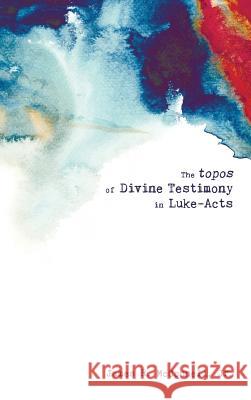The topos of Divine Testimony in Luke-Acts » książka
The topos of Divine Testimony in Luke-Acts
ISBN-13: 9781498227223 / Angielski / Twarda / 2014 / 334 str.
The topos of Divine Testimony in Luke-Acts
ISBN-13: 9781498227223 / Angielski / Twarda / 2014 / 334 str.
(netto: 257,73 VAT: 5%)
Najniższa cena z 30 dni: 269,13
ok. 16-18 dni roboczych.
Darmowa dostawa!
In this study James McConnell addresses the concept of authoritative testimony in Luke-Acts. Specifically, he argues that particular elements in the narrative of Luke-Acts can be understood as instances of the topos of divine testimony through utterances and deeds, considered in some ancient rhetorical handbooks to be the most authoritative form of testimony when seeking to persuade an audience. McConnell claims the gods' testimony was used in ancient law courts and political speeches to persuade a judge of a defendant's guilt or innocence, and in attempts in public forums to convince others of a particular course of action. Similarly, the topos is used in ancient narratives and biographies to legitimate certain characters and discredit others. The instances of the topos of God's speech (both oral and through OT citations) and deeds in Luke-Acts are functioning in the same way. As a rhetorical category, biblical scholars often use topos in a general and uncritical way. What McConnell presents in this work is a careful and clearly written challenge for biblical scholars to broaden and deepen their understanding of topos. His meticulous use of primary sources, thoughtful engagement with secondary sources, and exegetical insights will lead readers to view the characters in Luke-Acts anew through the rhetorical prism of divine testimony. --David M. May, Central Baptist Theological Seminary With keen insight drawn from Greco-Roman, Jewish, and early Christian literature, McConnell makes a clear and compelling case for the importance of the topos of divine testimony in Luke-Acts. This study illuminates the message of Luke-Acts and is an excellent contribution to studies on the rhetoric of the New Testament. --Josh Stigall, Briercrest College Bringing a wealth of insight from the study of classical rhetoric to bear on the interpretation of Luke-Acts, McConnell demonstrates convincingly that the topos of divine testimony functions primarily as a means of characterization, persuading the audience of the piety or impiety (and therefore guilt or innocence) of a given character. This book constitutes a noteworthy contribution to genre, narrative, and rhetorical critical study of the New Testament. --Julien C. H. Smith, Valparaiso University James R. McConnell, Jr., PhD, is Assistant Professor of New Testament Interpretation at the School of Divinity, Gardner-Webb University.
In this study James McConnell addresses the concept of authoritative testimony in Luke-Acts. Specifically, he argues that particular elements in the narrative of Luke-Acts can be understood as instances of the topos of divine testimony through utterances and deeds, considered in some ancient rhetorical handbooks to be the most authoritative form of testimony when seeking to persuade an audience. McConnell claims the gods testimony was used in ancient law courts and political speeches to persuade a judge of a defendants guilt or innocence, and in attempts in public forums to convince others of a particular course of action. Similarly, the topos is used in ancient narratives and biographies to legitimate certain characters and discredit others. The instances of the topos of Gods speech (both oral and through OT citations) and deeds in Luke-Acts are functioning in the same way.As a rhetorical category, biblical scholars often use topos in a general and uncritical way. What McConnell presents in this work is a careful and clearly written challenge for biblical scholars to broaden and deepen their understanding of topos. His meticulous use of primary sources, thoughtful engagement with secondary sources, and exegetical insights will lead readers to view the characters in Luke-Acts anew through the rhetorical prism of divine testimony.--David M. May, Central Baptist Theological Seminary With keen insight drawn from Greco-Roman, Jewish, and early Christian literature, McConnell makes a clear and compelling case for the importance of the topos of divine testimony in Luke-Acts. This study illuminates the message of Luke-Acts and is an excellent contribution to studies on the rhetoric of the New Testament.--Josh Stigall, Briercrest CollegeBringing a wealth of insight from the study of classical rhetoric to bear on the interpretation of Luke-Acts, McConnell demonstrates convincingly that the topos of divine testimony functions primarily as a means of characterization, persuading the audience of the piety or impiety (and therefore guilt or innocence) of a given character. This book constitutes a noteworthy contribution to genre, narrative, and rhetorical critical study of the New Testament.--Julien C. H. Smith, Valparaiso UniversityJames R. McConnell, Jr., PhD, is Assistant Professor of New Testament Interpretation at the School of Divinity, Gardner-Webb University.











